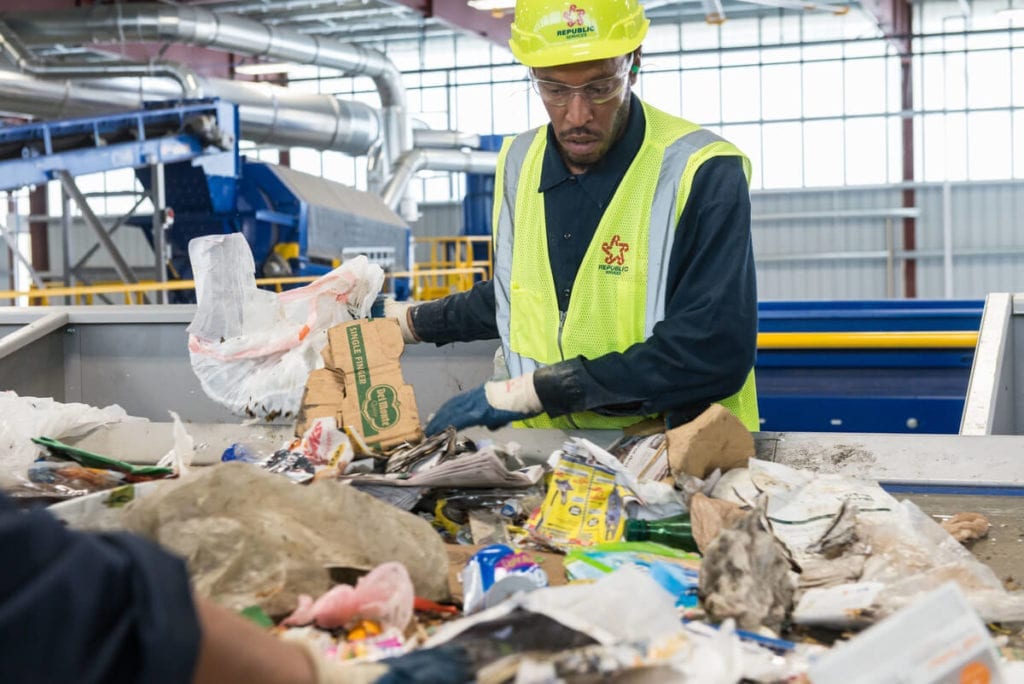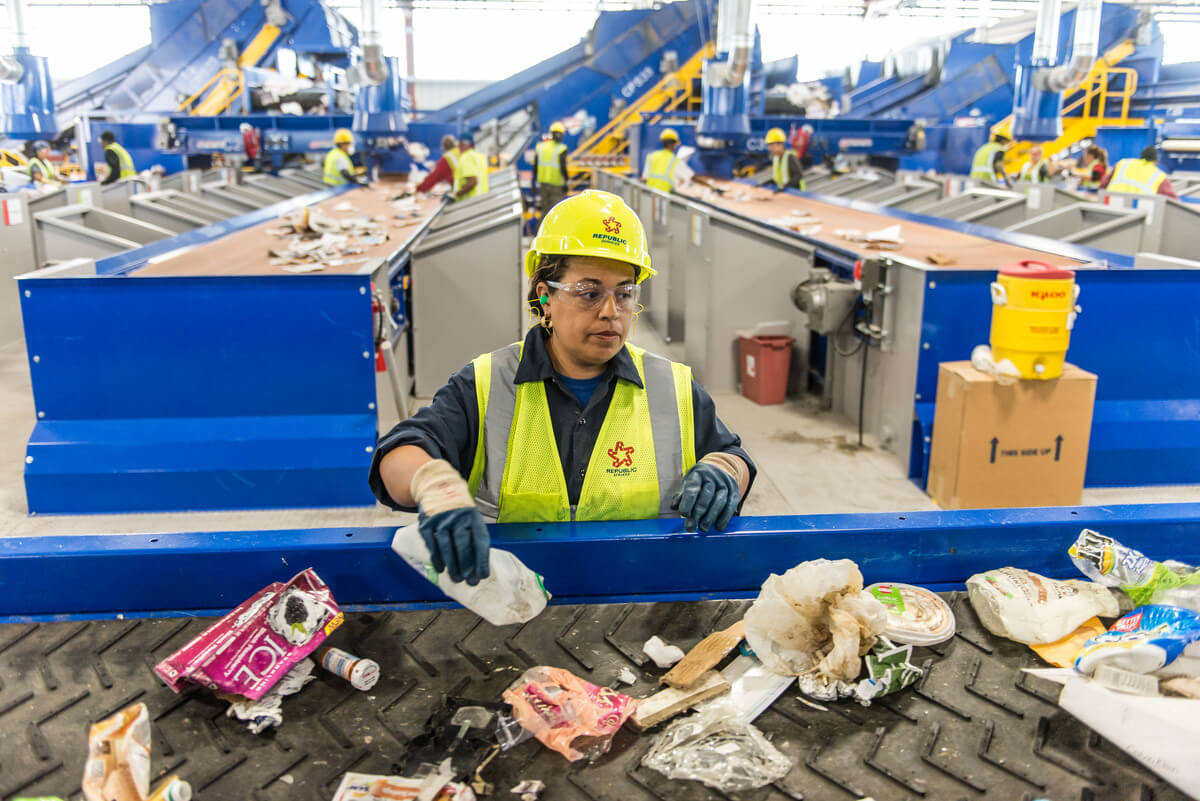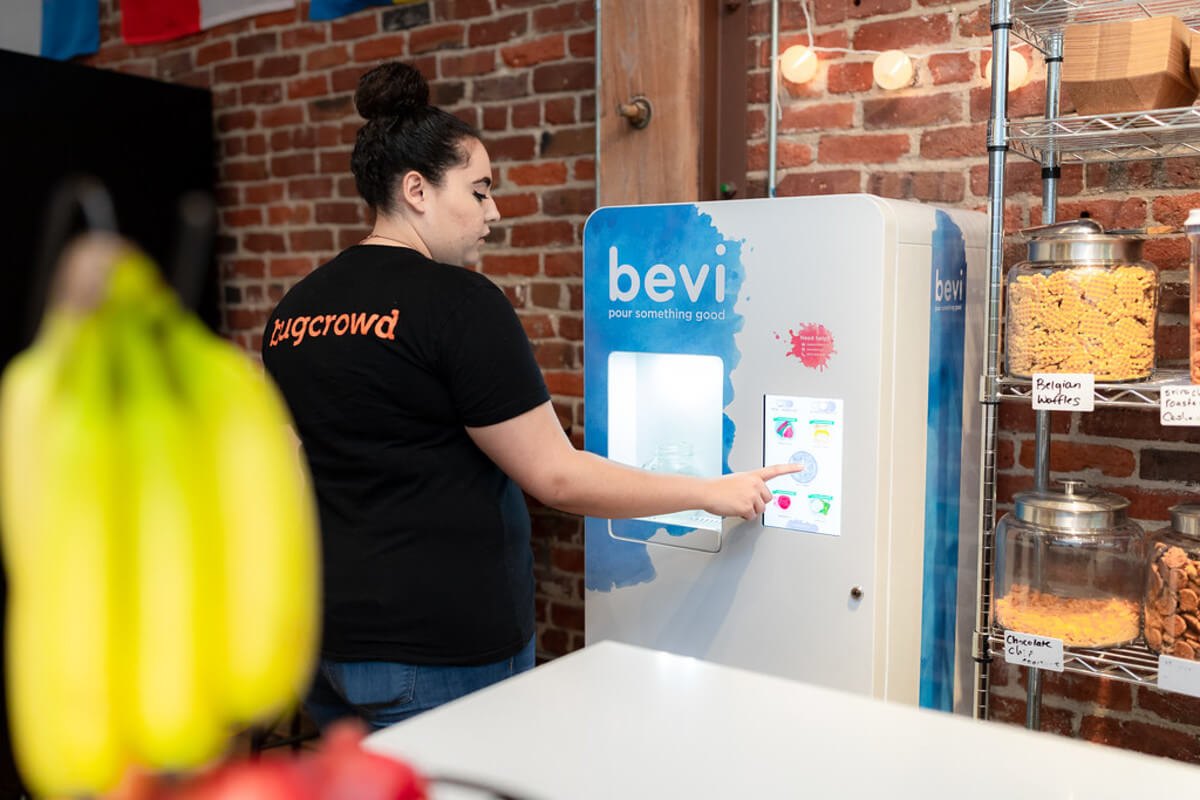Innovative Ways to Make Your Office More Sustainable

Like so many important workplace initiatives, recycling programs and other conservation efforts often start with the resident Ninja. We’re the ones with the office-wide perspective and an eye on the future. We interact with members of multiple teams and may even decide which products to use and how to dispose of waste. We are, essentially, the change makers.
So, if you’ve used your power and influence to convince your coworkers to recycle their trash responsibly, good on ya! But do you ever wonder if you and your team are doing everything possible to conserve the planet’s precious resources?
It’s a question that the Keep America Beautiful foundation wants you to ask yourself on America Recycles Day (November 15, 2018), a national day of awareness that encourages citizens to learn more about recycling, take action in their communities, and inspire others to do the same.
To source the best info for Ninjas and satisfy our own thirst for knowledge on the subject (here at ON HQ, we consider ourselves an eco-conscious squad), we hit up the experts at Republic Services, an industry leader in U.S. recycling and waste services, and our partners at Bevi, the company behind the smart water dispenser that replaces mass-produced bottled beverages with custom drinks.
Good Intentions vs. Greasy Pizza Boxes

Lesson #1: we don’t know as much about recycling as we think we do. Sure, we’ve put out the color-coded bins and asked everyone to separate paper, plastic, and metals; but, as Jessica Chen, Recycling Coordinator at Republic Services, explains, a few seemingly small mistakes can have a huge impact.
“Consumers have good intentions when placing their items into the recycle bin. However, unaccepted items must be hand removed at the recycling facility, causing delays and logistical issues,” she explains. “These items may contaminate a load of recyclables, causing the entire batch to be sent to the landfill.”
Obvious offenders include things like Styrofoam take-out containers, bubble wrap, and chip bags. But containers made from black plastic, Aseptic/Tetra Pak containers (think soy milk, juice, and coconut water cartons), and, in some districts, glass and bottles made from plastic #3-#7 (check an item’s recycling symbol) are also not accepted.
Unclean items can also spoil an entire batch of materials, and we’re not just talking about a half-empty bottle of ketchup. Take-out containers with food residue, almost empty soda cans, and even greasy pizza boxes can be problematic.
“At the recycling plant, these items are compacted and mixed in with other loads. The food and liquid squeeze onto the material and contaminate them,” Chen says. In order for an item to be successfully recycled, it must be clean and dry.
How many of these unaccepted items might you have unknowingly tossed into the recycle bin in the last month? Like you, your coworkers want to reduce their environmental impact when they recycle — they may just be unclear on what’s recyclable and what’s not. It’s definitely worth a friendly email or a quick office-wide tutorial to bring everyone up to speed.
Reduce + Reuse = Biggest Impact
While recycling is absolutely crucial to conserving resources, it has its limitations.
“Recycling is a costly process,” says Frank Lee, Co-Founder at Bevi. “Reworking recycled glass, aluminum, and other materials requires less energy than extracting and processing raw materials, but energy is still used in the melting process. By repurposing and reusing goods, we can eliminate the use of that energy entirely.”
If you’re looking for some ways to reduce and reuse in your office, this helpful article from Bevi outlines 30 practical, workplace-friendly ideas like swapping kitchen cleaners for castile soap, buying bulk sugar and creamer instead of individual packets, and investing in smart power strips.
Next-Level Sustainability for Offices
The growing urgency of conservation has also given rise to companies whose entire businesses are built around reuse + reduce. And some are especially suited to office sustainability programs.
“In order to get people to change, we design sustainable solutions that give people a better experience, rather than just guilting them with statistics about the amount of trash floating in the Pacific Ocean,” Lee said.
Here are a few of our favorite solutions:
Share Leftovers With Those in Need
Does your office frequently have a lot of leftover food after an event? Replate matches extra food with communities in need. Their platform enables charities and hungry individuals to recover food donations based on their needs and location.
Look Past Food Imperfections
Did you know that 1 in 5 fruits and veggies grown in the U.S. don’t meet grocery stores’ “cosmetic” standards and are often discarded even though they are perfectly fine to eat? If you’re in charge of stocking your office pantry with healthy snacks, Imperfect Produce offers a fully customizable subscription box of imperfect-looking produce delivered to your door.
Cut out the Can Middleman
If your team is obsessed with sparkling water (#LaCroixAddictionAnon), you probably spend a lot of time stocking and crushing cans. Instead, provide every team member with a reusable water bottle and install a Bevi water dispenser in your office. Their smart, all-in-one hydration solution provides filtered water and customizable fizz and flavor on tap, while drastically reducing overflowing recycling bins (and saving you time). Lee estimates that their smart water dispenser has saved over 51 million plastic bottles and cans from entering the landfill.
Give Swag Bags New Life
Got a mountain of those reusable branded swag bags from vendors, conferences, clients, or that event you put on 5 years ago, banished to a closet somewhere because you don’t want to deal with them but can’t bring yourself to finally throw them out? ChicoBag’s Pay it Forward Program repurposes these bags by distributing them to fixed and low-income families, or recycles them into new products through partnerships with artists, crafters, and non-profit organizations.
Ditch Single-Use Packaging
About 165 billion packages are shipped in the US each year, which equates to more than 1 billion trees worth of cardboard. Yes, billion. Your office can stop being part of the problem with Limeloop, a pioneer in sustainable shipping. They’ve created durable shipping pouches made of vinyl, upcycled from used billboard wraps, that are designed to be reused as many as 2,000 times!
Go Green with Office Supplies and Furniture
The Green Office is an online retailer that features over 60,000 green and conventional office products and a range of sustainability services designed to make office greening easy and cost effective. We love that they’ve taken out the guesswork by labeling and ranking their catalog by greenness, allowing you to balance price, performance, and sustainability.
Grow Your Network (Literally!)
Anybody else feel some serious guilt every time you’re asked to order a box of 2,000 business cards? Let your budding business relationships flourish with Botanical Paperworks’ eco-friendly plantable, seed paper business cards. Made from post-consumer materials and biodegradable, these business cards won’t go to waste.
Clean with Clean Products
Most commercial cleaning products contain toxic or potentially dangerous chemicals. Bio-based products from Grove Collaborative, a recurring shipment service of all-natural cleaning products, cut through grime as well as their chemical-laden, petroleum-based counterparts. And they’re competitively priced, making the switch an easy sell.
Switch to Renewable Energy
Offices consume a ton of energy. Luckily, if your workplace is in a deregulated electricity state, you can limit its environmental impact by choosing a green energy plan. Almost every electricity supplier offers these plans, which are powered by renewable resources like wind and solar. With the help of Choose Energy, you can compare and choose the best electricity rates and plans in your state. (Though, do check with your state’s energy providers directly for the most updated plan information.)
Making the Case to Go Green
Even if they care about conservation, a manager may focus on how your suggestions affect the bottom line. And while it’s true that some solutions may require an initial investment, these kinds of one-time, up-front costs typically save offices money in the long run.
Additionally, by choosing permanent, reusable items, Ninjas can save the time they’d typically spend on repetitive inventory, restocking, and reordering tasks and instead use it for deep thinking and high-impact work.
Teamwork Makes the Dream Work
When it comes to motivating your coworkers, aim to educate and empower. Employees engaging one another is often more effective than memos from the top. Forming a sustainability team can raise awareness and get more done, faster.
Projects for a sustainability team could include starting or enabling a more successful recycling program and helping to inform purchasing decisions on energy-efficient appliances and green cleaning supplies. A team like this can also educate staff through informational lunch-and-learn sessions with local departments that have water, power, or waste authority.
And don’t underestimate the power of games and incentives. “Host a zero-waste challenge week,” Chen suggests. Get employees to monitor the amount of trash they generate and reward the person or team producing the least amount of waste with an eco-friendly prize, like high-quality reusable containers or a bike rental subscription.
In honor of America Recycles Day 2018, join us in taking the Recycle at Work Pledge to recycle more of materials generated in the workplace by 10 percent over the next two years.
Let’s tap into our collective intelligence! What’s one thing you’ve done to reduce waste in your office? Leave your strategies in the comments below.

Good article! Our team normally eat lunch at office. Some brings from home and many orders from food supplier. We encourage members to order food from supplier can provide food within a sustainable container and then Seller can come to collect containers later.
Paper recycle : we let our team reuse paper that we already print 1 side. We set default on a printer to print out both side.
Reduce Clutter. My desk is disorganized and covered Clutters. I have organized my desk into a neat and look more space. Then I took a picture and post it to my colleague group page to remind them how to arrange and eliminate clutter every day.
Office sustainability is the goal of my company at Tayst.com. We focus on eliminating wasteful and unhealthy coffee pods by replacing them with fully sustainable and compostable pods. Check out the website and think about replacing your K-cups with a pod that will both caffeinate you and your office and help save the planet.
Great suggestion, Jason! Those cups can really add up — especially in a big office.
Be advised that the Choose Energy site is severely outdated, at least for electric providers in the areas I searched. One of the power companies that is still listed on the site was bought out in 2006. The EMC that is listed for my area has never served my area, and the EMC that has always served my area is not listed. This lack of update may be due to the fact that electricity is not regulated in my state, but I must wonder then why the energy providers are even listed as options.
THANK YOU for that reminder, Cecilia! We have added a note to remind people to check with their local power providers for updated information.